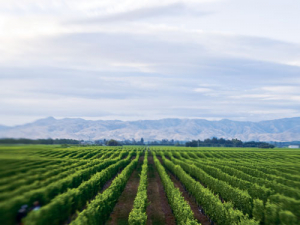John Barker of John Barker Law explains to Tessa Nicholson the areas that need to be considered before signing off on anything.
Firstly, what determines a contract? Is it a written statement signed by both parties? Can it be a handshake or even a verbal agreement? Will these two latter procedures stand up in a court of law if something goes wrong?
“To have a contract you classically need to have an offer, an acceptance and consideration,” Barker says. “But what is interesting in terms of grape supply contracts, is with the consideration. It is going to be about the price and you need to have sufficient certainty around what that is going to be. You need to have a price, or at least a mechanism that you can utilise to arrive at a price with some degree of certainty. So if it is just an agreement, then it’s not a binding contract.”
Many contracts are confirmed with a handshake and Barker says that can work.
“It may be as simple as; I have some grapes I want to sell to you. You want to buy those grapes. This is the price, this is when they will be delivered. But the problem with a handshake is there are a lot of additional aspects that may or may not be read into that contractual relationship.”
Some of those issues include; just when the grapes will be harvested, will there be any penalties, or whether at the end of the day the winery can reject the fruit.
“There are a host of things like that, that do come into the contractual relationship. Even if they are expressed, how binding they will be, depends on the nature of the commitment you have made through that handshake.”
But while he would suggest a handshake is not the best form of a contract, he also believes clients, both growers and wineries need to beware of convoluted written contracts involving multiple pages of legalese.
“A good contract should be easy to understand, so that someone who is not a lawyer can sit down and read it and understand what their obligations are. And I do believe it is important to get advice on a contract that is going to be worth a lot of money to you. It’s basic insurance.”
Interestingly enough, a number of grape growers in New Zealand do not seek legal advice. Barker can’t quite understand that – given the income from a supply contract could be worth more than the value of a person’s home.
“In a way the contract is your insurance policy. That may be a slightly negative way to look at it, but if you sit around and negotiate a contract beforehand and you have a good process, it doesn’t need to be at all adversarial. It can actually be a good opportunity to thrash out your understanding, so there are no hidden assumptions.”
Looking at what should be included in a contract, Barker is quite adamant about a few issues. One is a standard dispute resolution being included.
“You should always have a dispute resolution provision and in some respects that goes to the pricing side of things. Particularly if you have a mechanism to determine a price and you can’t agree, then you have to have a backup mechanism if possible, to reach agreement.”
There are a number of dispute resolution options available to the parties. Arbitration, which Barker describes as similar to a court style proceeding, but done in private. Mediation which brings the two parties together – although you may not necessarily gain an outcome because there’s no final decision maker. And then there is the third party expert determination.
“Each of those has its benefits and its downfalls. If you are thinking about your agreement, you need to think about the nature of the relationship and which of those resolution types will suit you best. And you have to have it on paper.”
Another important, and maybe the most important clause within your contract has to be certainty of payment Barker says.
“You need to have cash flow and what you are able to negotiate depends very much on your marketing power. It you look at some of the things post 2008, people had to wait until the wine had been sold. But a more typical arrangement may see you being paid around June with top ups consequently through the year.”
Again this needs to be clearly stated within the contract.
Risk management – is another area – who takes responsibility if something happens to the fruit between the time it has been harvested and the time it arrives at the winery?
“That comes down to when risk and title to the grapes is transferred. Is it at the vineyard gate or is it at the winery gate? That again is something that has to be negotiated between the grower and the winery – it is a very important clause.”
And finally, but certainly not the least important aspect of any contract, is the price you as a grower will be paid for your grapes. At this year’s Bragato Conference, there was a great deal of talk about whether the current method of average district pricing setting the benchmark, was a fair or just way. Barker says it has become a massive issue.
“Is it the best way? I would say no and certainly over the long term it has become quite circular. But it is the easiest way of dealing with this information gap we have. What are those grapes worth? What are others paying? How do I benchmark the price of my grapes in the market? I understand why people do it (use the district average price). Do I think it is the best way? Probably not. Is there another better way? Probably not.”
The reason for the consternation is because the average district pricing is not based on what people are being paid – it is based on the levies people are paying.
“You have this kind of standoff, because if people are waiting for what the district average price is, they are not paying for the grapes. So the levy doesn’t get paid. You have a weird situation where people are getting a district average price which is not really the district average price, because it doesn’t include all the people being paid on that price.
“At the heart of it is, where people are getting the prices from is not something that was designed to be a pricing mechanism at all. It is just designed to say how much levy has been paid. It has been picked up by wineries and by growers as well, because of the information gap.”
So negotiation becomes important when settling on a price – as does what that price is being paid for. Finding out what style of wine the purchaser intends making from your fruit is a sensible question to ask, Barker says. It will determine a number of vineyard management practices throughout the growing season.
Yield caps if instigated must be included in the contract. What quality parameters are required? What is the disease threshold to gain maximum payment? What brix level are you wanting, and what are the ramifications if I don’t reach that?
These are all pretty basic questions, but need to be part of a contract to ensure security for both parties. Without them, there is a higher chance of disputes arising and the costs associated with them.












